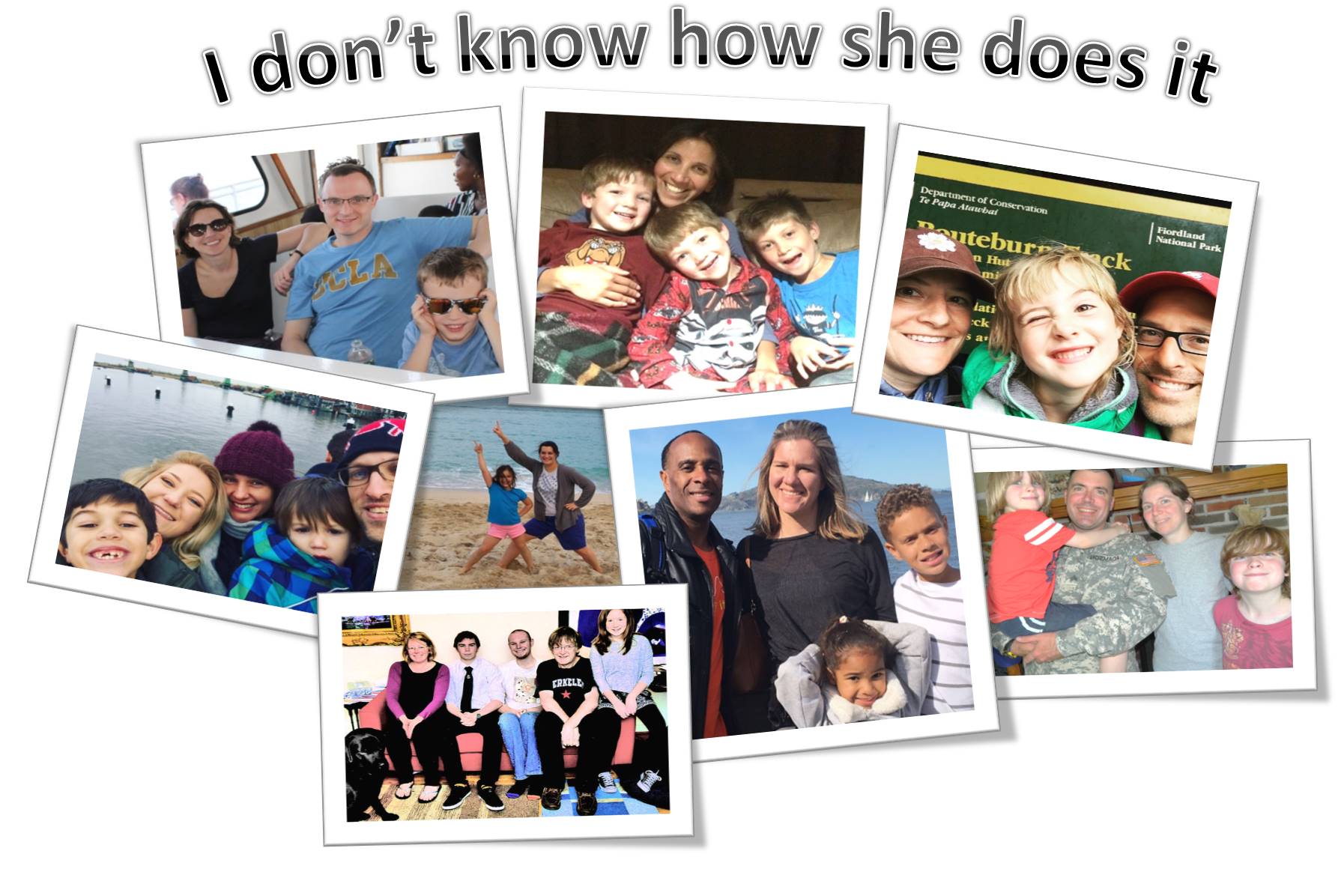A recent blog post, “How does she do it?” featured stories of women in neuroscience who have successful scientific careers and families. This post prompted a few of us who are plant scientists and moms to share our stories, in hopes of inspiring and supporting others as they decide whether and how to “have it all”. We hope that by showing how we’ve juggled these two different roles we demonstrate that a scientific career is not incompatible with motherhood, and that by sharing our hard-won strategies we make the road a little smoother for others.
Elizabeth Haswell, Associate Professor, Washington University St. Louis
Liz’s lab works on mechanosensitive ion channels in plants.
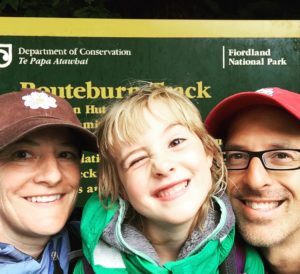 I found out I was pregnant with my daughter less than two years after starting my independent position. Washington University provides a semester of leave (for tenure track faculty only, though!), but I had new students, new grants, and felt pressure to publish as much and as quickly as possible. I worked up until the day she was born (my water broke during lab meeting!) and 2 weeks later I came back to campus to attend a graduate student’s qualifying exam practice session. In retrospect, I can see I was not particularly productive or competent, neither during nor after my pregnancy, and everything slowed down for about a year. I took the extra year on the tenure clock available to me, and I am grateful that things turned around in time for my tenure case.
I found out I was pregnant with my daughter less than two years after starting my independent position. Washington University provides a semester of leave (for tenure track faculty only, though!), but I had new students, new grants, and felt pressure to publish as much and as quickly as possible. I worked up until the day she was born (my water broke during lab meeting!) and 2 weeks later I came back to campus to attend a graduate student’s qualifying exam practice session. In retrospect, I can see I was not particularly productive or competent, neither during nor after my pregnancy, and everything slowed down for about a year. I took the extra year on the tenure clock available to me, and I am grateful that things turned around in time for my tenure case.
Now that I am out of the weeds a bit work-wise, and my daughter is in elementary school, our lives are settling down. Here are three ways I am currently trying to manage my work and family life. First, we have downsized and simplified. We rent a small, low-maintenance apartment within walking distance of my daughter’s school and the University, and we try to limit the number of activities any of us do. We also have a vacation cabin about an hour outside of St. Louis that we retreat to every few weeks for a sanity break and to indulge in a bit of free-range parenting. Second, my husband is and always has been a whole-hearted feminist. He does more than half of the work at home and is fully engaged in parenting, freeing me up to work long hours and travel regularly without guilt or extra work. Third, without any close relatives in the area, we have developed our own support network. A fantastic group of friends with kids of similar age, our church family, and work colleagues provide community and pitch in when we need help (like dealing with a flooded basement).
Advice:
Of course, no one can “have it all”. Instead, you have to decide what it is that you want to have (or you run the risk of letting other people decide for you!). Here are my two cents:
–None of us are as important as we like to think we are, in either the work or family sphere. In the spring of 2016 I was on sabbatical and wondered how my lab would fare without me at lab meetings—I had asked them to continue to meet in my absence. When I returned, it was obvious that they had grown more confident as individuals and as a lab group, and were easily troubleshooting and solving problems on their own. I (almost) felt left out! See Greg McKeown’s Essentialism.
–When we are genuinely needed, though, we want to be our best and most present selves. I definitely struggle to make boundaries, to stay focused on what is happening at the moment, and to protect people around me from what is going on in other spheres. I also am still trying to find the best way to rejuvenate and cultivate rest without guilt. I guess my advice would be to experiment with things like digital sabbaticals, silent commutes, and screen-free evenings, and see what works for you (one of my favorite authors on this topic is Cal Newport; see Deep Work).
–Once you have figured out how to protect your energy, you get to choose the most important ways to use it. This is your life to live, so try not to let it bother you when other people tell you how to do things or judge you. It can be crushing to be criticized for your travel schedule, breastfeeding choices, availability to students, or willingness to attend recruitment dinners. These days, I have written out work and family mission statements and try to use them to focus on what I can contribute to the world, and to guide all my choices (I have not read it yet, but I gather that The Life-Changing Magic of Not Giving a F*ck by Sarah Knight might help with this!).
Lindsay Triplett, Assistant Agricultural Scientist, Connecticut Agricultural Experiment Station
Lindsay’s lab works on disease-causing bacteria of crops to answer questions about their virulence mechanisms and phylogenetic diversity.
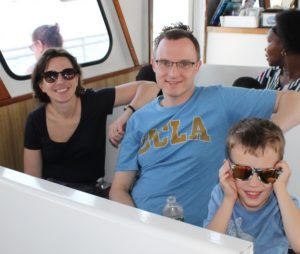 I’ve wanted a career in plant research since I was twelve, but I also loved thinking about microbiology and bacteria, so I was excited to learn that there was a field devoted to studying the interaction between the two. But I never even met a working scientist until midway through college, and the few professor-moms I encountered in graduate school mostly had a single child, often in their late thirties or early forties after they reached tenure. Reading about the substantial motherhood penalty in hiring and tenure decisions left me apprehensive about the effect parenting would have on my research career.
I’ve wanted a career in plant research since I was twelve, but I also loved thinking about microbiology and bacteria, so I was excited to learn that there was a field devoted to studying the interaction between the two. But I never even met a working scientist until midway through college, and the few professor-moms I encountered in graduate school mostly had a single child, often in their late thirties or early forties after they reached tenure. Reading about the substantial motherhood penalty in hiring and tenure decisions left me apprehensive about the effect parenting would have on my research career.
It turned out that having a baby significantly reduced the time I was able to spend working in the lab and at home, and this fact was actually surprisingly beneficial to my research. Scientists are very good at working a lot and being busy, but we aren’t good at resting our brains. But many studies have shown that rest and boredom are extremely important for your brain’s creativity! Before parenthood it was hard for me to leave my work at work. Child care, which is very time-consuming and dull, forced me to take a full mental break from the bench and the literature (not to mention the TV and internet) at a regular time each day. This allowed more chances for my mind to wander, and in that daydreaming I started to look at the scientific puzzles in front of me in a different way, noticing more pieces that were missing. While the volume of experiments I was performing decreased, my lines of questioning and output became more innovative.
When my son was a toddler I took a permanent research position at a state governmental agency, which has worked out very well for my family life. There is much less schedule flexibility than an academic job (there is no “working from home” unless you are taking one of your vacation days), but it lacks academia’s tenure deadline and the culture of working long hours. It’s nice that the leave and healthcare rights of techs, postdocs, and scientists alike are union-negotiated and written in a contract. Even if you picture yourself as a professor, you should be open to all sorts of career opportunities that come your way.
Still, my spouse and I both have had to learn to become extremely efficient. I’m definitely not a fun co-worker, because I don’t have much time for casual work conversation or happy hours. I do a lot of detailed meal planning, and we eat a lot of make-ahead and slow-cooker food. My family knows when certain things have to be on the shopping list, in the laundry hamper, or on our wall calendar if they want something done that week. We are very thankful to live in the age of automatic bill pay and vacuuming robots. I also had to learn to let go of a lot of things. I don’t exercise or call up my friends and family as much as I’d like. I know my child will never have homemade costumes for the school play or a made-from-scratch birthday cake like I had growing up with a stay-at-home mom, but he can identify more plants than most kindergardeners. You have to be happy with what you can offer.
There will always be overdue work deadlines and unfinished chores, but when things get stressful it helps to remind myself that childhood is finite. For example, something I really enjoy is our bedtime rituals. I figure that if my five-year-old lets me tuck him in and read him a bedtime story until he is ten, we might have about 1,800 more bedtimes together. Since I work late once or twice a week and travel about two weeks a year, I am aware that I’ll be there for almost 600 fewer bedtimes. I don’t do this math to feel guilty when I’m gone- I know my kid will turn out fine either way- but I find it helps me to appreciate the nights I’m there, and to give myself permission not to “lean in” all the time- to turn down that extra work trip or proposal review, and to leave the mess to clean up another day.
Siobhan Brady, Associate Professor, University of California Davis
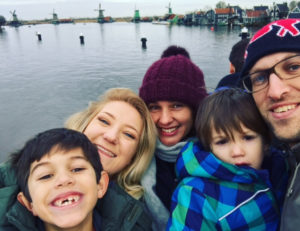 Siobhan’s lab studies how a network of transcriptional interactions regulates tissue development and function.
Siobhan’s lab studies how a network of transcriptional interactions regulates tissue development and function.
I am an Associate Professor at UC Davis in the Department of Plant Biology and the Genome Center. I am Canadian and did my PhD at University of Toronto, and my postdoc at Duke University. I have been married for 15 years now, and have two children, both boys, one is 8 years old and the other is 4 years old.
Although most days I don’t feel like I do BOTH managing a scientific career and a family well, in most cases I do “okay” depending on the day with one or the other. The way I do this can be simply summarized by one word: “Support”. Support can come in many different forms. There is no perfect formula as to the right types and amounts – it all depends on the person – what is available to them, what is financially possible and what they are comfortable with. For instance, my parents and my husband’s parents live in North America and are at least one flight away. I know not everyone is so lucky in this, or even have parents who are still with them or able to help. I am an extrovert and love being around people, but many of my friends are introverts and have found their own ways that they are most comfortable with to manage their science/family balance. These are only examples to illustrate what has worked for me. Most importantly – ask for help and figure out what works for you. Be open to all possibilities.
- My husband and our families. I had the absolute good fortune of having a partner who was able to work from home during my postdoctoral work and my first 5 years as an assistant professor. His doing this enabled me to really focus on my research and the research of my lab. I am so grateful for this and to him. Our families have also been endlessly supportive of both myself and of our children. Both of our parents came and helped us for 3 weeks each when I had each of my children. The emotional support that this gave me plus help with cooking and baby holding and hormonal outbursts was invaluable. In the times of tragedy, they have dropped what they were doing and have come to help “hold the fort”. Starting two summers ago, my in-laws have been having our kids stay for 2 weeks and then 4 weeks in the summer. During the busy summer conference season this has given them a period of stability during my frequent travel, an ability to know their “Bubie” and “Zaide” better and an experience of what it means to be Canadian.
- I am going to be brutally honest here – professional help in the form of counselling/therapy! As my academic career has progressed I frequently felt overwhelmed and very much suffered with self-confidence in the face of so much criticism and rejection and my feelings of inadequacy among my brilliant, uber-successful colleagues. When the number of tasks exponentially increased upon the birth of my first child simultaneously with “mommy” guilt, an enormous level of anxiety ensued. I found an amazing therapist who has played an enormous role in our transition to a two-career family with young children. I’ve learned so much more about myself, about my partner and about the consequences of my deep-seeded desire to be the best at everything. I now try to focus more on the immediacy of each task I need to perform and less on all the ways in which things can go wrong in the future. I also try to be kinder to myself and to extend this kindness to those around me.
- Your social community – friends. The one who first introduced me to “Imposter Syndrome”. My postdoctoral colleagues/friends with whom I have been able to be honest about my successes and failures and who help walk me through the anxiety of possibly not getting the next grant or any more in the future. My friends from graduate school who I am able to be unflinchingly honest with and who I am able to speak with about absolutely anything. Our friends in Davis who are really more like family. They support our entire family with their words, their kindness, fresh bread and cocktails, long weekends and camping/skiing trips together, and who are a stable set of role models for our children.
- I am an avid runner, cyclist and swimmer. Running in particular quiets my mind. It is essential for me to think clearly.
- My postdoctoral mentor gave me the opportunity to formulate crazy ideas and support on how to actually carry these out. He helped me understand how to strategize, how to find your niche and how to mentor and create a supportive group with a “critical mass”. Even now, he is always available to offer advice. Most importantly, he taught me that it is possible to be committed to your family and still be an excellent scientist. My faculty mentor helped me wade through choosing what committees to be part of, how to get tenure, how to manage my lab and how to deal with lab discord and a lack of funding.
- Family “help”. Having someone to help clean the house keeps us sane. More recently I have needed to rely on babysitters while my husband works away from home. This was really hard for me to do, but I needed to realize that I couldn’t do everything. As an added bonus, all these people have become members of our family – we adore them, our kids adore them and we will be on their team for the rest of our lives.
- My lab. My lab members are amazing. They trust me to guide them through some of the toughest times of their lives. They are open, funny and so smart – but all bring different skill sets and personalities to the table. They work as a team. Their success is my success, and my success is because of them.
- My colleagues and in particular, my female colleagues. I wanted to be part of a department with strong women who I had hoped could act as role models. The women I work with are direct, courageous and incredible mentors. The two colleagues who let my lab join their lab meetings and who were critical in decisions about which direction for the research to take. One of these has become a long-term collaborator and he has been open and honest and become a cornerstone of my career as a professor. Collectively, their doors are always open to speak about whatever concerns I have and my endless questions.
The attached picture is of my family in the Netherlands – we took a 3 month sabbatical. The extra person in the picture is our beloved babysitter Samantha, who helped home school our oldest son and who was also able to experience Europe for the first time.
Christine Fleet, Associate Professor, Emory and Henry College
Christine’s lab works on regulation of the hormone gibberellin and seed germination.
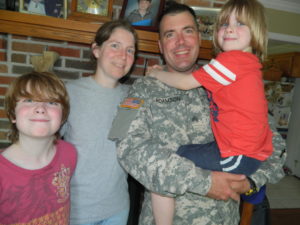 I started graduate school with the distinct impression that science and motherhood were incompatible, or at least that becoming a mother pre-tenure was a risky option. While I had strong female mentors, I heard many stories of difficult experiences, so when I found myself with the double good fortune of becoming a mother the same summer that I started as an assistant professor, I was both excited and wary.
I started graduate school with the distinct impression that science and motherhood were incompatible, or at least that becoming a mother pre-tenure was a risky option. While I had strong female mentors, I heard many stories of difficult experiences, so when I found myself with the double good fortune of becoming a mother the same summer that I started as an assistant professor, I was both excited and wary.
I was lucky to have come from a family-friendly post-doc and to land at a supportive institution. When my children were younger, my institution – a small, rural, liberal arts college – offered on-campus child care. This allowed me to get to know other faculty and staff with small children who could share both parenting and professional advice, as well as sharing playdates. In addition, the senior faculty in my department and division set an example by being open about their own family responsibilities and occasionally reminding me that it’s OK to just go home and be with family.
Now, I enjoy taking my kids into the lab once in a while or bringing science demonstrations to their schools. When my then-five-year old and I watched the Epiphyllum oxypetalum bloom in the greenhouse at midnight, it was a treat for both of us. And the occasional science lessons I share at my children’s school double as outreach for my institution.
My experience has made me realize that it’s important to show students the many faces of science and scientists. My kids make occasional appearances in my office and classes (especially on snow days), and I make a point of talking to my classes about examples of successful women scientists who have families, like Nobel Prize winner Carol Greider. I want students to see that there are many paths to a career in science, in hopes that they will see more open doors than I first did.
My advice:
-There’s no one right time to have a baby or become a parent, so pick what works for your own situation.
-It really does take a village to raise a child, and a parent. Having a nanny or relying on nearby family can be wonderful, but these often aren’t options for academics, so look for ways to build that village of support. Find networks among other parents at your institution or in your community, and don’t be afraid to ask for, and offer, help. And if you have a spouse or partner, that person’s support is vital.
-Seek mentors and role models. They can be a great source of advice and reassurance.
-On-campus childcare is a great help. As a toddler, my son had croup, walking pneumonia, and then conjunctivitis all in rapid succession (and all while my husband was deployed to Iraq), which meant that for a week or two after each diagnosis, I was at the daycare every day to administer his medicine at the appropriate times. Being able to walk across campus to do that between classes made it, well, doable. Getting to know other families at the daycare also provided support and lasting friendships.
-Conference travel with kids, or the whole family, can be win-win. When my kids were very young, I would never have been able to attend national meetings if I hadn’t brought my family along. I made important connections at those meetings that helped me stay active in my field of research, and my kids got the benefit of some fun side-trips from our travels. Thank you ASPB for providing child care at Plant Biology!
-As you become more established, don’t forget to reach out to support the next ‘generation’ at your institution, whether that’s by advocating with administration for child care and family leave policies, or suggesting babysitters or arranging playdates.
Gabriela Auge, Senior Researcher at Fundación Insituto Leloir, IIBBA-CONICET, Argentina
Gaby studies how plants integrate environmental information to regulate different developmental transitions throughout their life cycle, focusing on germination responses.
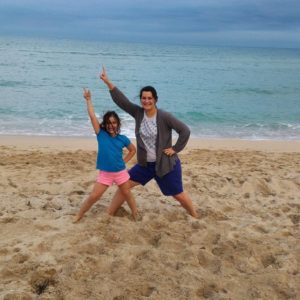 I am a first-generation college student in my family and then a first-generation academic in the extended family. Learning to balance work and life outside the lab was hard as the thought of a family life and pursuing an academic career were (and are being) viewed by senior researchers in my country as incompatible paths. Fortunately, even though I knew I wanted to enjoy doing research and be able to work long hours if necessary, I also knew I wanted to have a child. I had my daughter during the first year of my first postdoc. It took me a long time to find a routine that would work and my productivity obviously declined early on, but in the long run it worked. While it is early to say I successfully managed to be both, a scientist and a mom, this is how I did it so far:
I am a first-generation college student in my family and then a first-generation academic in the extended family. Learning to balance work and life outside the lab was hard as the thought of a family life and pursuing an academic career were (and are being) viewed by senior researchers in my country as incompatible paths. Fortunately, even though I knew I wanted to enjoy doing research and be able to work long hours if necessary, I also knew I wanted to have a child. I had my daughter during the first year of my first postdoc. It took me a long time to find a routine that would work and my productivity obviously declined early on, but in the long run it worked. While it is early to say I successfully managed to be both, a scientist and a mom, this is how I did it so far:
First and most importantly, I learned to use my time in the lab efficiently, I realized that 8 well-planned hours of work (coincident with daycare/school hours) are more productive than 12 unplanned-and-prone-to-procrastination hours. I have a to-do list for everyday work with tasks that are organized according to their priorities. I plan experiments carefully and organize students/collaborators workload beforehand so every single person involved knows what to do and when to do it. Of course, this doesn’t always work, so having a plan B in mind for unexpected situations helps. I try to leave weekends for family time, work from home whenever I can and rest well for an intensive work week.
Second, I have an amazing husband with whom I split duties and who takes care of things when I need to work long hours or when I have approaching deadlines. Thirdly, I tried to raise my daughter to be independent and self-aware, she is curious and creative, an amazing child that comes up with incredible ideas and makes motherhood look simple for me. And last but not least, I have also had very supportive advisors along the way, without their understanding it would have been impossible to follow this path.
I think these are the main pillars over which I base my productivity and ability to balance family and work effectively most of the time: work efficiently, have support from your partner, raise an independent kid and find understanding advisors.
Lastly, even though I cannot always spend the time I want at work or with my family, I learned how to enjoy the process, being a scientist and a mom at the same time are certainly not incompatible and both make me a happier person.
Anjali Iyer-Pascuzzi, Assistant Professor, Purdue University
Anjali’s lab studies mechanisms of resistance in plant roots to soilborne pathogens.
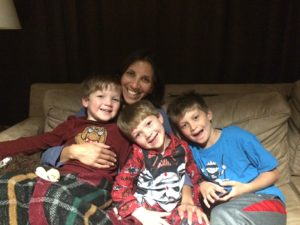 I always wanted to be a scientist, and I’ve always known that I wanted children as well. Like many other scientist–moms, it never occurred to me that I could not have both. I’ve been very lucky to have amazing graduate and postdoctoral advisors that reinforced this idea.
I always wanted to be a scientist, and I’ve always known that I wanted children as well. Like many other scientist–moms, it never occurred to me that I could not have both. I’ve been very lucky to have amazing graduate and postdoctoral advisors that reinforced this idea.
My sons are 7, 4 and 4. I had my first son as a postdoc and my twins four months into the tenure track. I’m a planner, but having twins makes you realize that sometimes life just happens and you can’t control it. While this wasn’t easy for me to accept, it’s actually been a huge help for my career, family and sanity.
My balance between work and family is constantly changing, because what works during one stage may be different the next, but here’s what I’ve learned so far that may be helpful to others:
- Have strong family, friend and/or community support. My husband and I went through a lot of difficult times in the first year after our twins were born, and having family and friend support was crucial, both for getting work done and family stability. If your family isn’t nearby, find good friends and neighbors in your town. It takes time, but is worth it.
- Choose a partner that wants to be an equal parent and supports your career. This has been key for me.
- Use your time wisely and focus on work at work. I’m very task-oriented and I stick to my scheduled tasks as much as possible each day. Find a time each day to write and read. I’m a morning person, and I wake up early and reserve that time for writing and reading. If you can’t find a chunk of time to write, write in small pieces. My postdoc advisor once told me that if you have four 15 minute breaks between meetings and you write during those breaks, that’s an hour of writing that you can accomplish in a day. He was right.
- Delegate and prioritize. You do not need to do everything – either in the lab or at home. Not everything is equally important. Learn what work and child-related things are most important to you and do those. It’s okay to say no!
- Compromise so that ‘good enough’ is ‘good enough’. I’m not the first person to say this, but being perfect gets in the way of getting things accomplished. There will always be something else to move from the ‘A’ to the ’A+’ column, both at work and at home. Do things well, but don’t worry about perfection.
- Have confidence in your ability as a scientist and as a mother. Stop reading the articles that tell you how hard it is (you already know that!) and don’t stress too much about what others are thinking. I realize that as scientists we certainly have to care about others’ opinions, but do not let it consume you.
- Do something you love that has nothing to do with work or children but that just makes you feel good. I’ve been a runner since I was 14, and running is part of who I am. I don’t have time to run as much as I used to, but I still do a short run nearly every day.
Mary Williams, Features Editor, The Plant Cell
Following 14 years as a Professor at Harvey Mudd College, Mary is now a Features Editor of The Plant Cell, primarily responsible for writing and editing Teaching Tools in Plant Biology and helping to build the Plantae.org community.
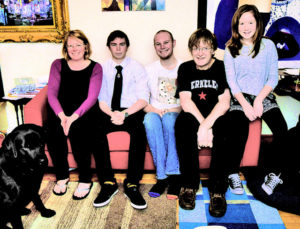 My sons are now 24 and 19 and were born during my postdoc and when I was a pre-tenure Assistant Professor. I became a single parent just after I got tenure when my boys were 7 and 2 years old. Having a supportive partner is great, but it’s also possible to go it alone, as I did for seven years before remarrying and changing jobs from Professor to Editor.
My sons are now 24 and 19 and were born during my postdoc and when I was a pre-tenure Assistant Professor. I became a single parent just after I got tenure when my boys were 7 and 2 years old. Having a supportive partner is great, but it’s also possible to go it alone, as I did for seven years before remarrying and changing jobs from Professor to Editor.
Childcare is the biggest challenge for most parents and the hardest to solve, unless you’ve got willing relatives or lots of money. Childcare is hugely expensive (in much of the world) and often hard to find, but having a reliable, trusted caregiver is crucial for surviving working parenthood. Knowing that your children are safe and happy from 8am to 6pm frees you up to be productive at work, which provides you the liberty to switch over to parenting mode when you are with your children. You’ll also need childcare when you are traveling and during school holiday times, and a back-up plan for when your child is sick and ineligible for normal day care. (It’s a good thing you’re a scientist and able to solve problems!).
You also need to learn to work differently once you have children. After years of focusing solely on research before my first child was born and working as needed around the clock, I had to learn to compartmentalize and plan days with concrete beginning and endings. I’m more efficient, productive and fun when I’m focused on one activity at a time.
Remarrying meant two parents to share the responsibility and also a daughter and eventually a dog. The relative ease of my working and family life now is a welcome relief from the constant stress of single parenthood. It also highlights the fact that parenting gets easier eventually – one son is teaching in Japan and the other spends most of his time away from home at University, so my time is much freer than when they were young. The intense demands of early parenthood don’t last forever, and you’ll have many highly productive years after they are grown and gone – take the long perspective!
Advice:
Ask for help when you need it. Science selects for independently-minded high achievers who may not be comfortable asking for help, but juggling research and childcare is very demanding. Don’t try to do everything on your own. Many of your friends, neighbors, relatives and work colleagues would be happy to help out from time to time. Embrace babysitting coops and carpools! I maintained mental health through regular Friday night dinners and playdates with a friend whose children were the same age.
Expect support from your institution. Ideally, your job will provide you with on-site childcare for infants and toddlers, but this is rare. You should at least expect access to a private space for nursing and access to back up child care services. Scheduled out-of-workhours meetings should include either the option to bring children or arrangements for childcare. Increasingly, childcare is being provided at conferences too.
Stand firm. Change is incremental, and not always welcomed (for example, some peers without children may feel allowances made for parents is discriminatory). Be willing to stand up for yourself and your needs. Develop a network of people fighting similar battles that will provide you with the safe space to express your frustrations.
Allies are crucial. My life became immeasurably less stressful when I got a department chair who embraced the philosophy of inclusiveness. He felt that it was not the job of the individual to change the culture, but the job of the culture to change to support the individual. Making the work environment accommodating to mothers should not entirely be up to mothers.
Gitta Coaker, Professor, University of California, Davis
Gitta’s lab studies the interaction between bacterial pathogens and plants. In particular, we are interested in gaining a greater understanding of plant immune signaling and applying this knowledge to generate disease resistant crops.
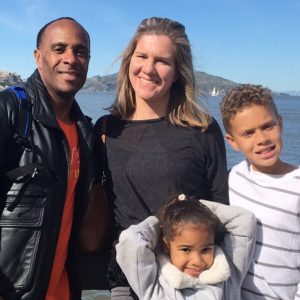 I’ve always been fascinated with science and plants in particular. My mother worked very hard and instilled that children and a career are possible. My son Jadyn is 11 and was born while I was a postdoc. My daughter Siena is six and was born when I was an Assistant Professor. For me, having two kids spaced apart at different career stages worked well. Although managing a career and family life can be overwhelming at times (especially with kids under two), it is worth it! I have so much fun with my family and they have enriched my life in many ways. There is no one ideal way to juggle family and career, but here is my advice:
I’ve always been fascinated with science and plants in particular. My mother worked very hard and instilled that children and a career are possible. My son Jadyn is 11 and was born while I was a postdoc. My daughter Siena is six and was born when I was an Assistant Professor. For me, having two kids spaced apart at different career stages worked well. Although managing a career and family life can be overwhelming at times (especially with kids under two), it is worth it! I have so much fun with my family and they have enriched my life in many ways. There is no one ideal way to juggle family and career, but here is my advice:
- Get outside help to manage your family responsibilities. Get on-site daycare if possible. We have a housekeeper and gardener that come twice a month. I would rather spend my spare time doing something that I enjoy. Academia will not make you rich, but this is money well-spent.
- Pick a spouse who is an equal partner and will help you balance your family and career.
- Take advantage of your flexible work hours to maximize your productivity and coordinate family responsibilities. Share your schedule with other young scientists in your group. Don’t be afraid to bring your kids into the lab/office if you don’t have childcare and need to get things done.
- Take time for yourself and do something you like several times a week. I love to run/lift weights and try to make time to exercise most days. When I am consistently exercising I feel better, sleep better, and am less prone to stress.
- Maximize your work efficiency. Try to schedule meetings in blocks and two days a week for your deadlines/science/lab. I make a to-do list and move down the list onto a new item if I am not making quick progress.
- Don’t be so hard on yourself. I think women are frequently their own worst critics. There will be times when you feel like you are not accomplishing enough at work or home. In the end, those feelings will pass. Have fun, make new discoveries, and take the time to enjoy your kids!
Comments? Questions? Want to share your own story? Join the discussion at the Plantae community pages.


